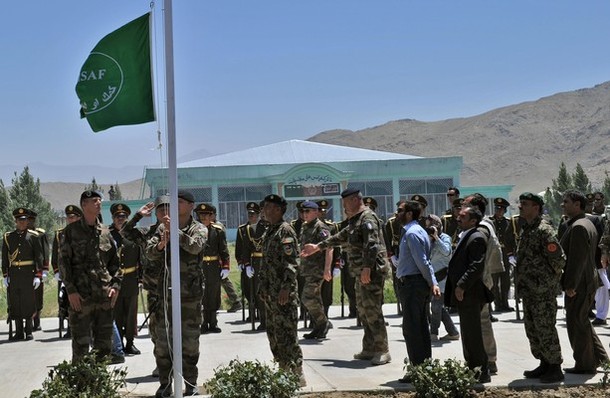There are roughly 900 days to go until NATO plans to shift responsibility for combat operations to Afghan forces in December 31, 2014. This is a long time and the timetable could shift through progress or frustration, but the force that will assume the lead for combat is being built today.
While there is a steady stream of bad news coming from Kabul–corruption, the insider threat, and heroin production–NATO’s efforts to develop, train, and equip Afghans is a source of good news. As ISAF Commander General John Allen said in Chicago, “The expansion and professionalization of Afghan security forces now allow[s] us to recover the remaining 23,000 U.S. surge troops by this fall, enable us to continue to pressure the Taliban to reintegrate and reconcile, and make possible security transition to the Afghans in accordance with our Lisbon commitments – and on time.”
At the end of the solar month Saur (May), the Afghan Army stood at 186,000 and fieldsUS-made light weapon systems, light armored vehicles, and is supported by a modest air force. When it reaches its end-strength of 195,000 later this year, it would rank as the fourth largest in NATO, slightly greater than the UK and slightly smaller than Germany. As NATO seeks new opportunities to promote global stability and the Afghans look for news ways to pay for the force, incorporating NATO-trained Afghans into NATO operations is a possibility.
Consciously eschewing conscripts, the Afghan Army is an all-volunteer force and is increasingly professional. Once stymied by illiteracy, over 135,000 have graduated from a NATO-sponsored literacy program, which has enabled advanced training in intelligence, artillery, and logistics. To ensure the training is self-sustaining, NATO has trained over 3,200 Afghan Army instructors who are taking the place of NATO trainers.
With some successes, the army continues to face stubborn attrition with 2.3 percent in May, which is above the target of 1.4 percent. While there is no shortage of volunteers, attrition can undermine force readiness and wastes hundreds of millions of dollars on training. Further, Afghans still struggle with maintenance, which exacts a toll on the force.
A similar story exists with the Afghan police. At 144,000, recruiting has halted to rebalance the force and concentrate on professionalizing basic patrolmen. Prior to the creation of NATO Training Mission-Afghanistan, patrolmen received uneven international support. More than 100,000 police have had basic literacy training, which enables them to read the laws they are supposed to enforce, inspect identification cards, and develop a sense of pride.
In spite of the shortcomings, Afghans are heavily engaged in combat operations, where they sustain at least twice the rate of casualties as coalition forces and are responsible for security for more than 50 percent of the population. By year’s end, about 75 percent of Afghans will receive security provided by Afghans. The most difficult areas in the south and east will continue to occupy NATO’s combat attention, but it is good news that Afghans have assumed such a large role.
Progress in Afghanistan is not only dependent on the development of Afghan security forces but also on the state of the insurgency. While security incidents and civilian casualties are down according to the UN mission there, the fundamentals still exist for resurgence. Yet, my colleague Colonel Robert Cassidy, like others, argues that the conflict is not just in Afghanistan. Writing in Small Wars Journal, he obverves, Afghan Taliban would likely have withered away over the last several years of the surge if Pakistan had stopped support for the regeneration, resting, recruitment, and retraining of militants, improvised explosive device makers, technology, and components of those devices in its tribal sanctuaries, Baluchistan, and in the heartland of Pakistan.”
While the Afghan military and police are developing and will enable transition from NATO, the rest of the Afghan government lags in its development. Unfortunately, NATO is better at building militaries than governments.
Derek S. Reveron, an Atlantic Council contributing editor, is a Professor of National Security Affairs and the EMC Informationist Chair at the U.S. Naval War College in Newport, Rhode Island.
Image: isaf%20afghanistan.jpg
